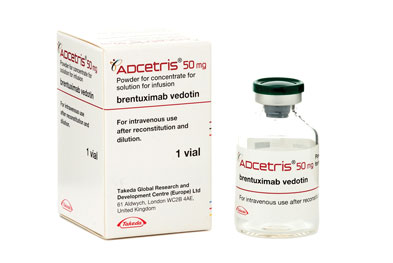Seattle Genetics Announces FDA Approval of ADCETRIS® (Brentuximab Vedotin) for Primary Cutaneous Anaplastic Large Cell Lymphoma (pcALCL) and CD30-Expressing Mycosis Fungoides (MF)
November 13, 2017
Source: finance.yahoo
 719
719

Seattle Genetics, Inc. (SGEN) announced that the U.S. Food and Drug Administration (FDA) has approved ADCETRIS (brentuximab vedotin) for the treatment of adult patients with primary cutaneous anaplastic large cell lymphoma (pcALCL) and CD30-expressing mycosis fungoides (MF) who have received prior systemic therapy. Primary cutaneous ALCL and MF are the most common subtypes of cutaneous T-cell lymphoma (CTCL). The approval is based on data from the phase 3 ALCANZA trial and two phase 2 investigator-sponsored trials. The phase 3 ALCANZA study was designed to compare ADCETRIS monotherapy administered every three weeks versus physician’s choice of representative standard of care options, methotrexate or bexarotene. The trial met its primary endpoint with the ADCETRIS treatment arm demonstrating a highly statistically significant improvement in the rate of objective response lasting at least four months (ORR4) versus the control arm as assessed by an independent review facility. ORR4 was 56.3 percent (95% CI: 44.1, 68.4) in the ADCETRIS arm compared to 12.5 percent (95% CI: 4.4, 20.6) in the control arm (p-value <0.001). The most common adverse reactions (≥ 20 percent) were: anemia, peripheral sensory neuropathy, nausea, diarrhea, fatigue and neutropenia.
This is the fourth FDA-approved indication for ADCETRIS, which also has: (1) regular approval for treatment of classical Hodgkin lymphoma (cHL) patients who fail autologous hematopoietic stem cell transplantation (auto-HSCT) or who fail at least two prior multi-agent chemotherapy regimens and are not auto-HSCT candidates, (2) regular approval for the treatment of patients with cHL at high risk of relapse or progression as post-auto-HSCT consolidation, and (3) accelerated approval for treatment of systemic anaplastic large cell lymphoma (sALCL) patients who fail at least one prior multi-agent chemotherapy regimen. Accelerated approval in the sALCL indication is based on overall response rate, and continued approval for this indication may be contingent upon verification and description of clinical benefit in confirmatory trials.
In November 2016, the FDA granted ADCETRIS Breakthrough Therapy Designation (BTD) for the treatment of patients with pcALCL and CD30-expressing MF who require systemic therapy and have received one prior systemic therapy. The FDA also granted Priority Review for the supplemental Biologics License Application (BLA), and the Prescription Drug User Fee Act (PDUFA) target action date was December 16, 2017.
“Cutaneous T-cell lymphoma is a blood cancer of the skin with no known cure and few new treatment options. It is a disfiguring disease in dire need of more effective and durable treatment options to help keep this debilitating and painful disease at bay,” said Susan Thornton, cutaneous lymphoma patient and chief executive officer of the Cutaneous Lymphoma Foundation (CLF). “As both a patient and representative of the cutaneous lymphoma community, we welcome the FDA approval of ADCETRIS as a new treatment option for the most common subtypes of cutaneous T-cell lymphoma in patients who require systemic therapy and we look forward to sharing this important milestone with patients and physicians.”
“Our phase 3 ALCANZA clinical trial evaluating ADCETRIS in patients with primary cutaneous anaplastic large cell lymphoma and mycosis fungoides, which are the most common types of cutaneous T-cell lymphoma, demonstrated superior efficacy with durable responses for long-term disease management when compared to standard of care treatment options methotrexate and bexarotene,” said Clay Siegall, Ph.D., President and Chief Executive Officer of Seattle Genetics. “These data, along with data from investigator-sponsored clinical trials, led to the FDA approval of ADCETRIS as a treatment for patients with pcALCL or CD30-expressing MF, which represent the most common subtypes of CTCL. This FDA approval, which was granted more than a month in advance of the PDUFA date, represents a significant milestone for the lymphoma community. Our goal is to establish ADCETRIS as the foundation of care in CD30-expressing lymphomas and this approval represents our fourth FDA-approved indication.”
The FDA approval is based primarily on positive results from a phase 3 trial called ALCANZA that were presented at the 58th American Society of Hematology (ASH) annual meeting in December 2016 and published online in the Lancet in June 2017. Results from the ALCANZA trial in 128 pcALCL and CD30-expressing MF patients requiring systemic therapy included:
By Ddu
Read more on
- AZ’s Farxiga Gets FDA Priority Review For Heart Failure January 8, 2020
- Global Recall of CyPass Micro-Stent by Alcon September 3, 2018
- Breakthrough Device Designation Granted to Digital Intervention for Alzheimer’s August 27, 2018
- FDA Approved Eye Drop Oxervate to Treat Neurotrophic Keratitis August 27, 2018
- First Dual-Lead Nerve Stimulator for Pain Management gets FDA Nod August 22, 2018
your submission has already been received.
OK
Subscribe
Please enter a valid Email address!
Submit
The most relevant industry news & insight will be sent to you every two weeks.



